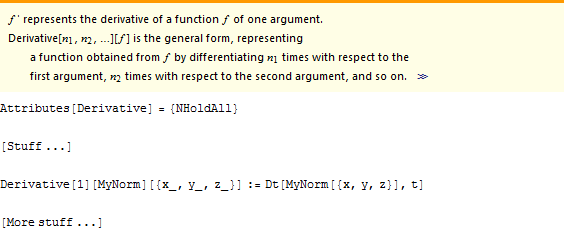' or Derivative has the following attributes:
Attributes[Derivative]
{NHoldAll, ReadProtected}
Conspicuously absent is the Protected attribute. This means that, unlike many other system functions, downvalues for Derivative can be defined directly.
In this case you seem to want this definition (as suggested by wxffles in comments):
MyNorm'[{x_, y_, z_}] := Dt[MyNorm[{x, y, z}], t]
The total derivative Dt is needed here to explicitly indicate that all variables depend on t.
Show it works:
MyNorm'[{x, y, z}]
(2 x Dt[x, t] + 2 y Dt[y, t] + 2 z Dt[z, t])/(2 Sqrt[
x^2 + y^2 + z^2])
If you clear the ReadProtected attribute you can see the definition is indeed assigned to Derivative:
ClearAttributes[Derivative, ReadProtected];
??Derivative

Usually you would use TagSet or TagSetDelayed (/: = or /: :=) to associate this definition with MyNorm but in this case it would appear to deeply nested:
MyNorm /: MyNorm'[{x_, y_, z_}] := Dt[MyNorm[{x, y, z}], t]




myNorm'[{x_, y_, z_}] := Dt[myNorm[{x, y, z}], t]? $\endgroup$